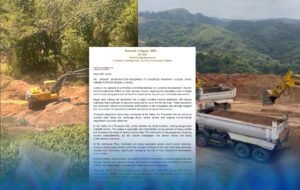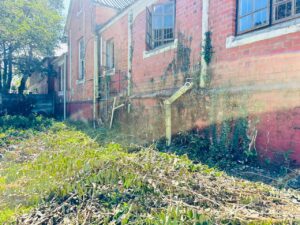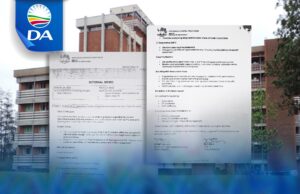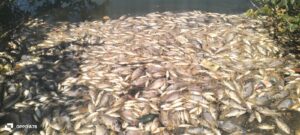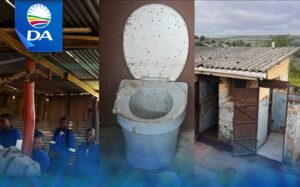Today’s KwaZulu-Natal (KZN) Special Adjustment Health Budget comes in response to the Covid-19 pandemic – a health crisis which is unprecedented in more than a century and which has massive budgetary consequences, not only for the province’s Department of Health (DoH) but also for the entire provincial fiscus. It is an unmitigated scenario that requires transparency, accountability, and leadership, rather than arrogance or passing responsibility for errors on to departmental officials.
The DA’s praise and applause go to the many healthcare workers, who tirelessly saved thousands of lives in KZN. There can be no argument that without their hard work our health system would have collapsed. KZN’s high recovery rate is due to their sacrifices. They worked through their fear of becoming infected and taking the virus home to their families. They also worked through the now well-documented Personal Protective Equipment (PPE) shortages and quality concerns and even through over-crowded Covid-19 wards and chronic under-staffing. Sadly, despite precautions, 6 062 healthcare workers were infected, with 69 deaths.
As the Chairperson of the South African Health Professions Council (SAHPC) has stated, we must go beyond applause to actual government support. This is why KZN Health MEC, Nomagugu Simelane-Zulu’s recent arrogance towards nurses living at the Wentworth Hospital residence is all the more shocking. These are the same nurses that continued to sacrifice their safety while providing critical services during the entire lockdown. Yet they have now received eviction notices from the DoH. They are allegedly being punished because returning doctors from the ANC’s pet Cuban Doctors project now need accommodation. This appalling situation must not be forgotten. Nor must the many PPE-related healthcare workers’ strike action at Stanger, Umgeni, Northdale Hospitals, and many other facilities. Then there are the nurses and patients who continue to fight and even get stuck in lifts at Addington Hospital.
While KZN’s DoH had already complained about insufficient funds within its original budget to provide quality health services, during the pandemic, the Department received an initial R138 million from the Disaster Relief Grant. This was topped up by the additional R4,5 billion to its equitable share and R446 million to the new Covid-19 component of the HIV, TB, and Malaria Grant. It is incorrect to say that these additional funds, particularly the equitable share funds, came from National Treasury. The reality is that these are KZN funds that the Provincial Treasury scavenged from every provincial Department, besides Health and Education. While these funds provided some relief, they remain insufficient.
Covid-19 has also resulted in massive reprioritisations or virements within the DoH’s budget, to the tune of approximately R1,4 billion. The most concerning of these is the R90million for the non-filling of posts at provincial hospitals. While the Department calls these savings, the reality on the ground for patients is dirty, over-crowded regional hospitals with increasingly over-worked staff. These reprioritisations will unfortunately also impact services within many of KZN’s communities. MEC Simelane-Zulu recently indicated that there is a mitigation plan for this, particularly regarding improving antenatal care attendance, additional vaccination programmes, HIV/AIDS, Tuberculosis, and other chronic disease follow-ups. The DA will be monitoring this programme very closely. The last thing we need post-Covid-19 is an increase in maternal and child mortality or an outbreak of a vaccine-preventable disease.
Instead of saving on the non-filling of posts, funds should have been saved by regularising the many month-to-month contracts for security, cleaning, catering, and medical waste management. These contracts cost the Department millions of Rands every financial year and ultimately lead to a qualified audit outcome. The new October deadline for contracts to be in place is now long overdue after being pushed from November 2019 to March 2020 until next month. This cannot be delayed again. These proper savings can be used to mitigate any second wave costs or reduce the expected R2 billion overspend.
The ANC-led provincial government cannot escape from the gross corruption seen within PPE procurement during the pandemic. This scourge has been aptly described as the hyenas wanting to feed. In KZN, this corruption took the special form of blatant over-pricing. For example, the DoH paid between R60 and R90 for 12 0000 N95 masks, with an ultimate cost of R7,8 million. This despite the Treasury-regulated price of R37,80 per mask. The DA will be reporting the company concerned to the Competition Commission. Strangely, while EDTEA MEC, Nomusa Dube-Ncube was busy investigating and closing other companies for over-pricing, she ignored these tenderpreneurs. During a recent SCOPA meeting, questions were raised after it was found that a certain supplier of medical gloves, Sebenzani Trading 622 CC, happened to share the same contact details as three other government suppliers. The DoH has no answers for this. Today, the DA calls for closer and proper investigations into the quality of PPE provided, in particular the Chinese-made N95 masks. Do they have SABS certification?
This week, Professor Salim Abdool Karim praised the DA-run Western Cape leadership for the nearly impossible task of establishing the world’s largest field hospital at Cape Town’s ICC – with oxygen at every bed as well as ICU facilities. The DA also welcomes KZN’s new facility infrastructure. The new isolation and quarantine wards at Clairwood Hospital are indeed world-class. There were, however, four field hospitals that were supposed to come online. While the Royal Showgrounds and Clairwood Hospital facilities were used successfully, the field hospitals in KwaDukuza and Ngwelezane were 4-6 weeks overdue from their mid-July completion dates. The completion of these two facilities will come after KZN’s Covid-19 surge and the DA now requires clarity on their future use. While MEC Simelane-Zulu has indicated that they will be available to hospitals as additional beds, the Department’s Infrastructure Unit has indicated that they are on six months’ rented contracts. Millions of Rands have been spent on these facilities. They cannot become short-lived, barely used white elephants. If this occurs, it must be regarded as irregular expenditure. These are funds that could have been used to expand infrastructure at Northdale Hospital and prevented the grief and pain of the Khumalo family, along with many others who have suffered poor healthcare at this facility.
The DA continues to call on citizens to behave responsibly, to wear their masks, practice physical distancing, and follow Covid-19 regulations. MEC Simelane-Zulu has a similar duty to ensure that the funds allocated to her Department are spent wisely to improve KZN’s health system – and make sure that they are not stolen by tenderpreneurs. The DA will ensure she realises this responsibility.
